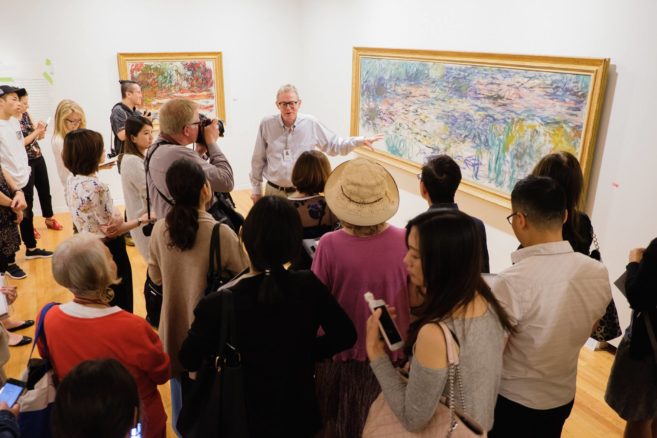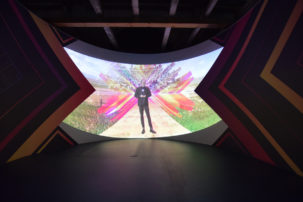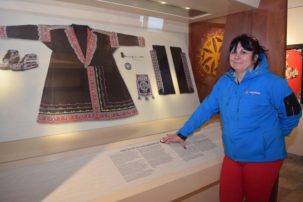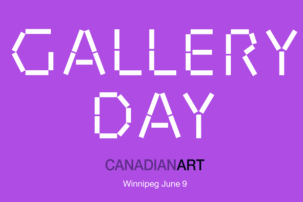It’s just a couple of weeks into 2017—a year slated by the government as an opportunity to “celebrate” Canada’s 150th birthday—but Indigenous artists and allies have already generated some cogent critiques of the official #Canada150 hashtag on social media.
Michif artist Christi Belcourt and Anishinaabe photographer Nadya Kwandibens were among those who took to Twitter on January 2 with incisive views.
#Canada150 years on stolen land.
— Christi Belcourt (@christibelcourt) January 3, 2017
Don’t tag my art #Canada150 and/or #reconciliation. My art does not celebrate colonialism nor does it bow to the industry of reconciliation.
— Nadya K. (@_anishinaabekwe) January 2, 2017
Likewise, artist Chippewar (a.k.a. Jay Soule of Thames First Nation) posted a satirical version of the Canada 150 logo on his Instagram feed early in the new year. His versions—also available as free sticker packs through the Chippewar website—read “Canada 150 Years of Genocide,” “Canada 150 Years of Assimilation” and “Canada 150 Years of Broken Treaties,” and are posted with similar hashtags.
A photo posted by ⚫⚪????????CHIPPEWAR⚫⚪???????? (@chippewar) on Jan 1, 2017 at 6:48pm PST
Though it is only 10 characters long, the #Canada150 hashtag can have heavy consequences in terms of appropriation and assimilation, which is why some of these artists are speaking out.
“In December, I noticed a few times my photography was reposted with the Canada150 and reconciliation hashtags,” Kwandibens explains in an email to Canadian Art when asked about why she decided to weigh in on social media. Kwandibens, through her studio Red Works Photography, is known for photos of Indigenous peoples, events and places. “I needed to let the public know my position as an artist and an Indigenous person, that it’s not okay to conveniently stamp my artwork with these labels because, foremost, it isn’t fair to those I’ve photographed that their portraits be used on social media as the face of Canada’s happy, reconciled, Indigenous people when this isn’t necessarily true.”
“It’s important to point out that my work is concerned first and foremost with empowering Indigenous peoples, fostering resurgence and narrating resistance,” Kwandibens continues. “And while Red Works Photography can be a means for non-Indigenous people to begin to understand the complexities of Indigenous people/life, specifically through my photo series works, it must be noted that Indigenous peoples are at the centre of what I do. Associating my work with Canada 150 is akin to erasing the very struggles, resurgences and resistances I set out to celebrate.”
A renewed push against the #Canada150 hashtag was also afoot among Indigenous activist communities as of January 1. Among them was @apihtawikosisan, a.k.a. Métis lawyer, author and blogger Chelsea Vowel, on the morning of January 1.
Fuck #Canada150. Going to be resisting all the colonial white supremacist myth making this year. pic.twitter.com/HChQUmBIQs
— âpihtawikosisân (@apihtawikosisan) January 1, 2017
Ok Canada, 2017..can we have clean water now? 90+ FN communities..9-0, 90 without drinkable water. #canada150
— Hayatsgan (@hayatsgan) January 1, 2017
When ppl ask me what im doing to celebrate #canada150 pic.twitter.com/0MVmrvSKUC
— Not Your (Sav)iour (@sangriasav) January 7, 2017
My people had a functioning participatory democracy for a thousand years and #canada150 is supposed to be celebrated? #naw
— RedIndianGirl (@RedIndianGirl) January 11, 2017
Some, like Russ Diabo, a Mohawk policy analyst, and Raven Sinclair, a founding editorial member of Indigenous Voices in Social Work, also started to use an alternative hashtag: #Colonialism150.
Canada puts the “CON’ in constitution! #Colonialism150 #NoJusticeNoPeace2017
— Russ Diabo (@RussDiabo) January 1, 2017
I don’t really want to celebrate the anniversary of confederation. #Colonialism150
— Raven Sinclair (@JustSaying2016) January 3, 2017
Maybe if the treaties were respected the way they should be. #Colonialism150
— Raven Sinclair (@JustSaying2016) January 3, 2017
Also joining the call: allies to Indigenous artists and activists critiquing #Canada150, including Winnipeg librarian Monique Woroniak, planning theorist Christopher Alton and Eric Ritskes, founder and editor of the open access journal Decolonization: Indigeneity, Education and Society.
Canada marks its 150th year. Its citizens walk among descendants of peoples who planted seeds of their nations 10,000 years ago. #canada150
— Monique Woroniak (@mworoniak) January 2, 2017
.@newyorktimes110 In 2017 I will continue rejecting this narrative. #canada150 pic.twitter.com/mouqIdh2uy
— Christopher Alton (@xtopheralton) January 4, 2017
A photo posted by Eric Ritskes (@eritskes) on Jan 7, 2017 at 10:32am PST
Social-media response was so positive to the revamped logo that Ritskes decided to put it on T-shirts as a fundraiser for Onaman Collective, an Indigenous grassroots land-based art initiative sharing traditional knowledge and language with youth.
“I thought it was a great chance to not only disrupt the dominant narrative of celebration but also lift up and support a grassroots Indigenous organization,” Ritskes says in an email.
Creeping up close to $1000 raised for @OnamanCollectiv, have you got yours yet? https://t.co/Ukoer10ahf #canada150 #colonialism150
— Eric Ritskes (@eritskes) January 12, 2017
The T-shirt image has been repurposed by other commenters as well:
#canada150 is #propaCanada. https://t.co/d1edeLQ0Vd
— SamMukwa ᒪᒃᐗ (@SamMukwa) January 9, 2017
And yet, there are still 50 weeks left in this year of Canada 150 “celebration.” It will be a long haul to sustain this stream of critique and resistance against colonialism. But it is also a critique that can take many shapes, Kwandibens notes.
“I have been limiting the time I spend on online lately, in part because of some frustration with having to constantly read these topics being discussed and argued, which is a good thing, but I’m trying to stay offline mostly because it’s difficult to focus on new works to be launched soon,” Kwandibens says in an email. “I’m focusing on new multimedia works that centre and amplify Indigenous voices, specifically the voices and perspectives of Indigenous women and LGBTQ2S. Ultimately, my art is my resistance.”

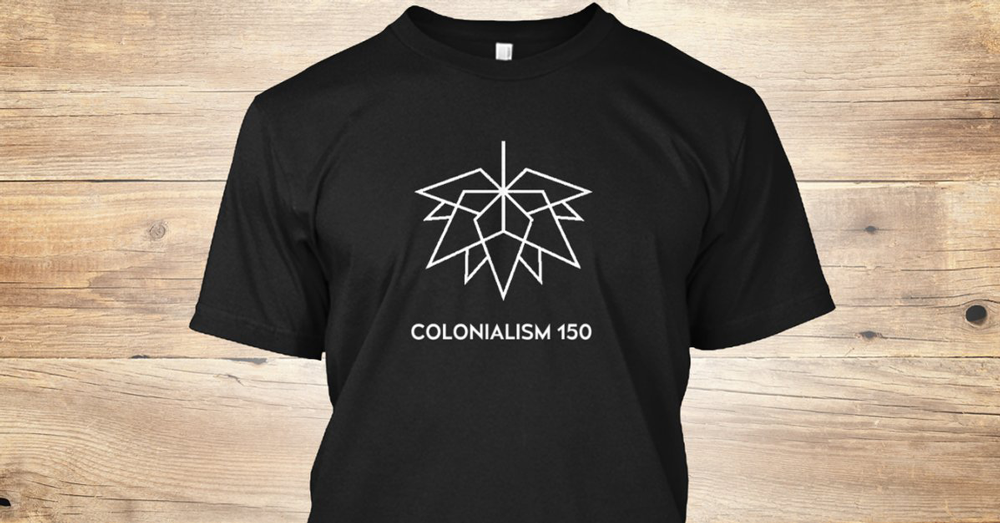 After receiving positive response to his subversive versions of the Canada 150 logo on social media, decolonization researcher and activist Eric Ritskes decided to put them on T-shirts as a fundraiser for Onaman Collective, an Indigenous arts organization. Photo: Teespring.
After receiving positive response to his subversive versions of the Canada 150 logo on social media, decolonization researcher and activist Eric Ritskes decided to put them on T-shirts as a fundraiser for Onaman Collective, an Indigenous arts organization. Photo: Teespring.
